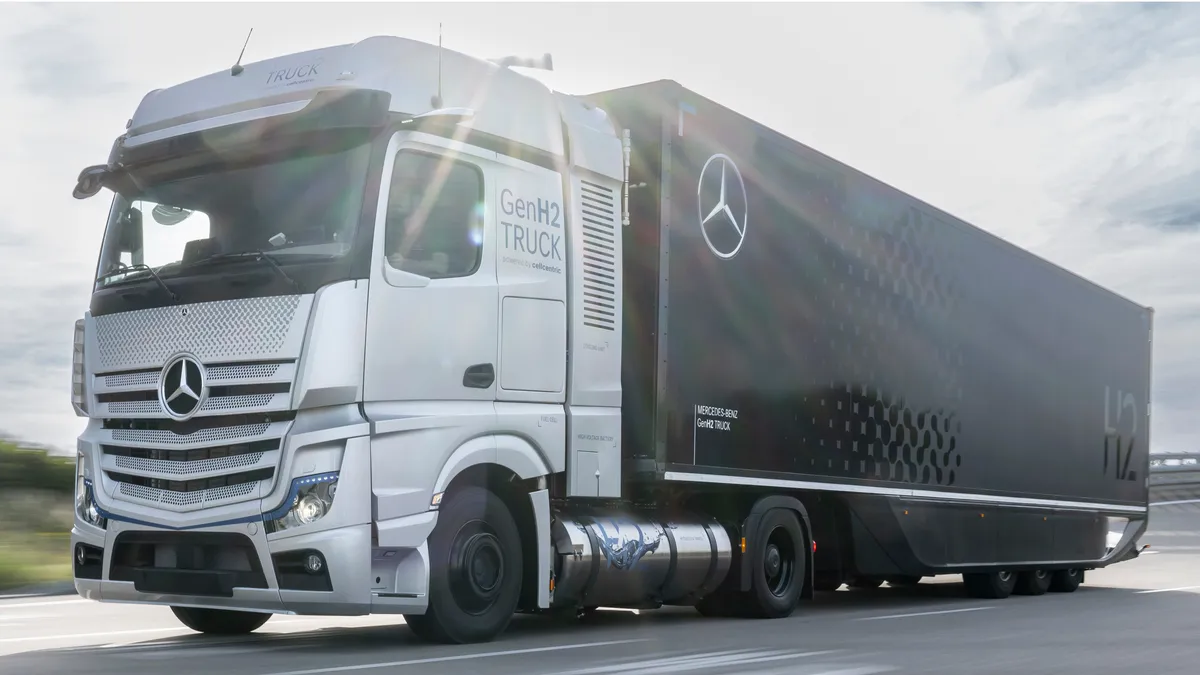Dive Brief:
- Daimler Truck will road test its Mercedes-Benz hydrogen fuel-cell trucks by midyear, conducting separate trials with Amazon, Air Products, Holcim, INEOS and Wiedmann & Winz on specific routes in Germany.
- Daimler aims to make its carbon neutral vehicles available in core markets, including the U.S., Europe and Japan, by 2039.
- The Mercedes-Benz GenH2 trucks will be fueled at two public liquid hydrogen filling stations. However, more international refueling infrastructure will need to be added in the coming years, along with a supply of liquid hydrogen from clean energy sources, also known as green hydrogen, Daimler said.
Dive Insight:
The five companies could gain experience with the hydrogen-fueled trucks as they advance their own sustainability goals. Amazon plans to reach carbon neutrality by 2040, and global business materials company Holcim plans to do the same by 2050.
“The decarbonization of our transport network plays a crucial role in achieving” carbon neutrality by 2040, Andreas Marschner, vice president of Amazon Transportation Services, said in a statement. “All logistics stakeholders — from manufacturers to energy companies and operators — must therefore continue to invest, experiment and innovate.”
Amazon has multiple initiatives underway to decarbonize its transportation sector. In 2019 it purchased 100,000 electric vans from Rivian to electrify its fleet of delivery trucks. But electric vehicles would be less ideal on long-haul routes through rural areas, which would lack battery-charging infrastructure.
The fuel cell trucks can produce their own electricity through the use of hydrogen, making them more suitable for the job. Daimler’s September road test proved that hydrogen fuel-powered trucks had more than a 1,000 km range on a full battery, reaching 1,047 km (650 miles).
The trial comes as more countries consider higher restrictions on conventional trucks and their emissions. In the United States, the Biden administration recently announced a plan to accelerate the conversion of the nation’s fleet of heavy-duty trucks to zero-emissions vehicles. The push comes alongside other initiatives from government organizations, such as the Environmental Protection Agency’s proposed rule to further curb emissions from new trucks and the Department of Energy’s “SuperTruck 3” program that offers $127 million to fund partnerships focused on zero-emission truck technology, including hydrogen-fueled vehicles.
The trial trucks will use Daimler’s new “subcooled” liquid hydrogen technology, sLH2, which significantly reduces transport costs and increases vehicle range by having a higher energy density. The subcooled approach allows for higher storage density and easier refueling within 10-15 minutes, compared to LH2, Daimler said.
The first customer trials will transport a variety of products, including building materials, sea containers and cylinder gas, They will refuel at sLH2 stations close to the French border near the Rhine river, and over 200 miles north closer to the Netherlands in the Duisburg area.
The sLH2 technology developed by Daimler with industrial gases and engineering company Linde is freely available to other companies. Daimler plans for a higher level of transparency around the sLH2 technology, to collaborate where possible and enable the development of more refueling and vehicle technologies that would apply to the new liquid-hydrogen standard.
In addition to transporting gases as part of the trial, Air Products is also providing Daimler with refueling infrastructure and hydrogen.
“Our latest mobile fueling station for liquid hydrogen will be used for the project in the Duisburg area and can therefore operate under real conditions,” Caroline Stancell, general manager for the Europe and Africa division of Hydrogen for Mobility within Air Products, said in a statement.










